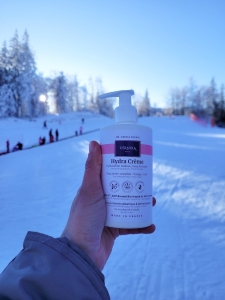Reading Time: mins
Castor oil, extracted from the seeds of the Ricinus communisis recognized for its moisturizing and repairing properties. Historically used in hair and dermatological treatments, it is now being critically evaluated as a sunscreen. This article explores its SPF protection level and suitable suncare alternatives.
Castor oil is packed with benefits for hair and skin. Primarily known for improving hair health, its moisturizing qualities come from its rich ricinoleic acid content, offering anti-inflammatory benefits and antimicrobial properties, useful for treating a variety of skin conditions.
Composition and benefits : Rich in essential fatty acids and vitamin E, it improves skin hydration and protects against pathogens. Its ricinoleic acid also contributes to skin suppleness and resilience.
Dermatological use : Applied to the skin, it helps fight acne and reduces inflammation, promoting a clear, healthy complexion.
Despite its many properties, castor oil only offers an SPF of around 6, insufficient to effectively protect against UVA and UVB rays, which can cause premature aging and skin cancer.
Given the inadequacy of oil as a UV filter, it is essential to find effective alternatives for better protection, especially for sensitive skin regularly exposed to the sun.
Broad-spectrum sunscreens : Opt for products containing mineral filters such as zinc oxide or titanium dioxide, which offer complete protection against all types of UV rays.
Complementary strategies : Add skincare routines using natural oils such as castor oil to moisturize and strengthen the skin barrier, while using a sun protection product with a suitable SPF.
All Rights Reserved | Tous Droits Réservés GTIN Compliance Hydra Lavant | GTIN Compliance Hydra Crème



